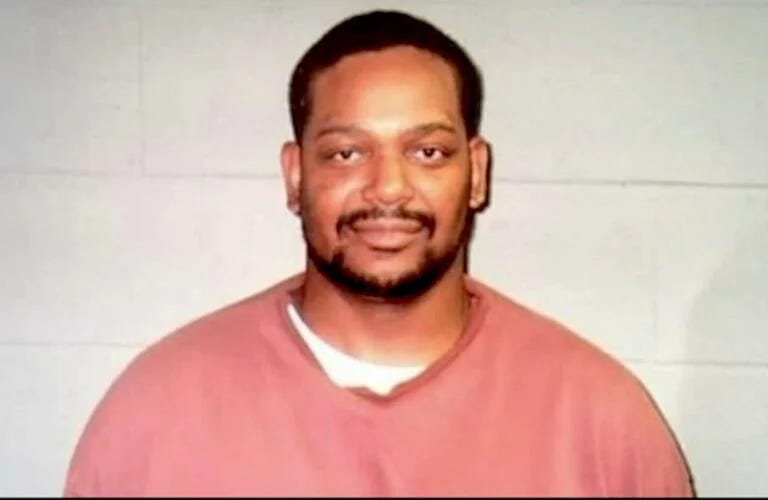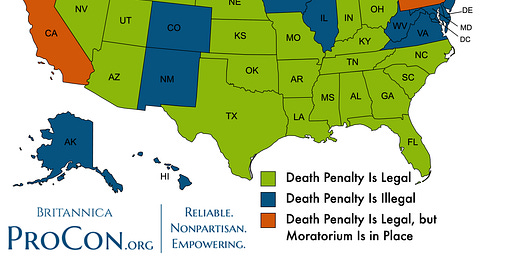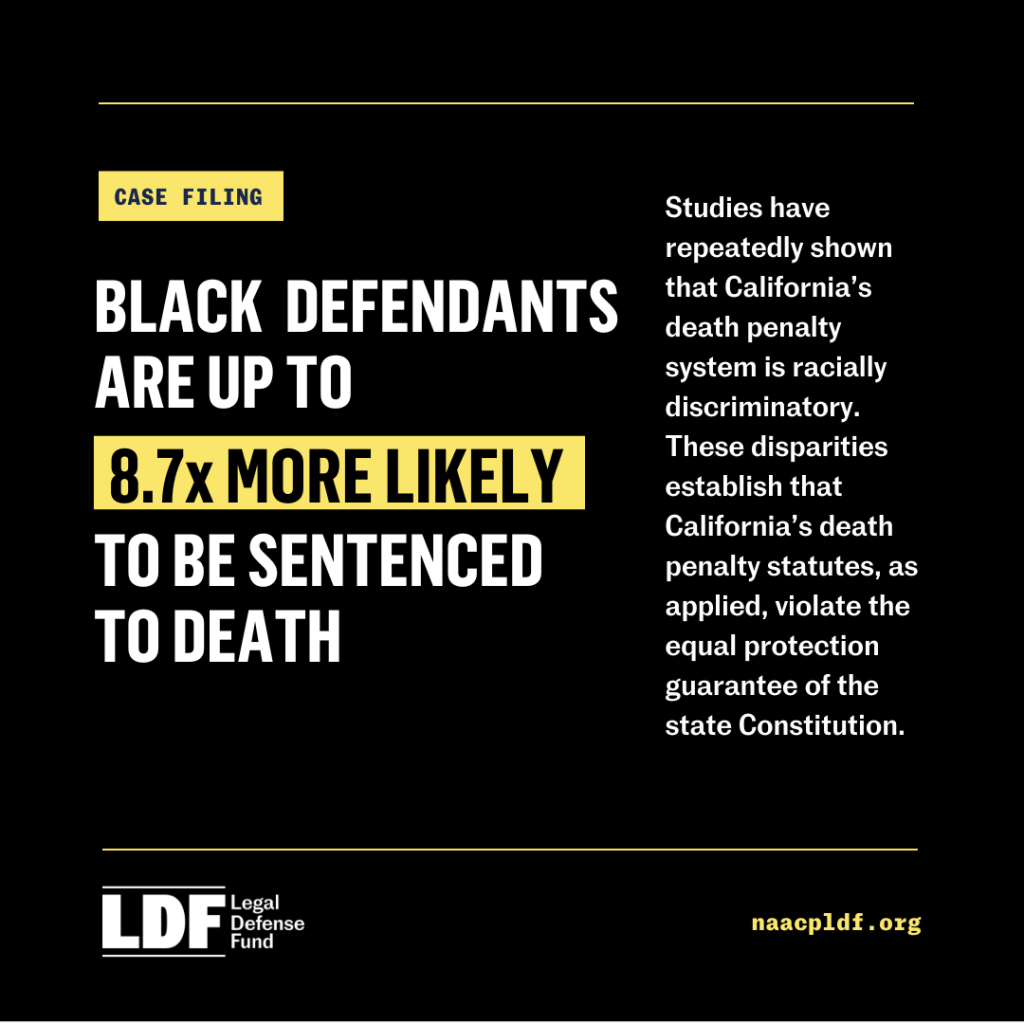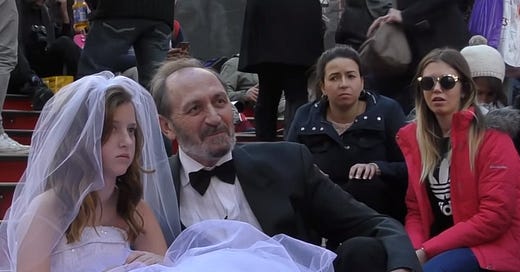
Why We Must Abolish the Death Penalty in the United States
Debunking the 5 most common myths cited to defend capital punishment
While I’m grateful my home state of Illinois has abolished the death penalty, as of June 2024, another 27 states still permit the practice. Those states are Alabama, Arizona, Arkansas, California, Florida, Georgia, Idaho, Indiana, Kansas, Kentucky, Louisiana, Mississippi, Missouri, Montana, Nebraska, Nevada, North Carolina, Ohio, Oklahoma, Oregon, Pennsylvania, South Carolina, South Dakota, Tennessee, Texas, Utah, and Wyoming.
So, especially if you live in one of these states, I encourage you to read and share this insight to help abolish the death penalty in your state.
Why?
It’s quite simple, really. If we truly care about equal justice under the Constitution, we must abolish the death penalty nationwide. Below, I address the criticisms of abolishment, and debunk five of the most common myths cited in support.
So, Let’s Address This.
Claim: We know for certain that innocent people are not convicted or put to death, and if they are, it is a tiny and insignificant number.
Unfortunately, we know the opposite is true. Since 1973 alone:
…at least 197 people who had been wrongly convicted and sentenced to death in the U.S. have been exonerated.
In the modern era, America has executed roughly 1500 people for capital crimes.
With 197 known exonerations—solely because additional investigations were performed—that suggests the horrifying fact that at least 1 out of every 9 people executed were actually innocent. That is an 11% error rate. We wouldn’t tolerate that error rate in any other scenario. Imagine if on your next flight the pilot got on the intercom and announced there’s an 11% chance the plane won’t work once it’s in flight. Or an 11% chance a physician misdiagnoses cancer? Why then, would we tolerate an 11% error rate for the death penalty, when even 1 wrongful execution is 1 too many. This is simply unconscionable and is the antithesis of justice. We must do better, and that begins by abolishing the death penalty nationwide.

Claim: The death penalty is a deterrent to violent crime.
On the contrary, study after study shows no link between the presence or abolishment of the death penalty and the rate of violent crime historically punished with the death penalty.
The Death Penalty Information Center, which collects studies on this topic, reports:
The death penalty affects only a tiny percentage of even those who commit murder. Its effect is very difficult to pinpoint, and the National Academy of Sciences has concluded that past studies have neither proven nor disproven a deterrent effect.
In short, the claim that the practice deters violent crime is just that—a claim. No actual evidence exists to support this assumption.
Claim: The victims of violent crime won’t see justice if the death penalty is repealed.
Let’s be clear. For the victims and families of violent crime, especially involving murder, nothing can bring back a life lost. No words or actions exist to remedy their pain. That’s why it’s so much more important we recognize that execution and justice are two different things altogether, and we cannot make the mistake of conflating them.
Enacting the death penalty won’t bring back a life lost to a horrific crime. Once that crime is committed, however, society can ensure the culprit is prevented from committing further harm. Families of victims can and should pursue restitution, damages, and financial compensation for the loss of their loved one—and receive them quickly.
Meanwhile, cases often take years or even decades. That leaves the lives of the victim’s families and the culprit’s families in limbo. Instead, the culprit should face swift accountability with prison. That allows victim families to move on without having to relive trauma with ongoing court cases. But speaking of justice, as I iterate below, given how many innocent people are sentenced to death, justice mandates abolishment to prevent the wrongful conviction and execution of the innocent.
Claim: It is a waste of taxpayer dollars to house, cloth, and feed a violent criminal until they die in prison.
In reality, death penalty cases cost about 48% more than the cost of sentencing someone to life in prison. Likewise:
A New Jersey study found, between 1983 and 2005, taxpayers paid $253 million more for the death penalty system than for a system with life without parole as its maximum sentence.
In short, if cost truly is the concern, then life in prison is far more efficient a use of taxpayer funds than is the death penalty.
Claim: The death penalty is the great equalizer, applied fairly across economic and racial class.
On the contrary, the death penalty is one of the most grotesque examples of racially and economically discriminatory application of the law. For example, of the 173 exonerated former death row inmates, 91 are Black. Put another way, Black Americans are only 13% of the population, but were 53% of those wrongly convicted of a capital offense. Moreover, of those on death row, 42% are Black, once again demonstrating the racial bias in our legal system. In states like California, for example, the death penalty has not been abolished but is now in a moratorium, in part by evidence that Black defendants are 8.7X more likely to be sentenced to death than are white defendants for the exact same crimes. This racial disparity in California is not the exception nationwide, but the norm—and that’s truly frightening.
Likewise, while the wealthy can afford world class legal representation and avoid the penalty, this is a punishment disproportionately reserved for the poor and destitute. Such an unjust system cannot be allowed to continue.
In conclusion:
It is no wonder that Americans are committed to ending this practice. Polling shows that more than 60% of Americans support life in prison over the death penalty. It is a shame, therefore, that despite overwhelming support from the American people, and despite the ample evidence demonstrating the death penalty is unjust and does not make our nation safer, 27 states still permit capital punishment. We must embrace the movement to end the death penalty in America, nationwide, and better fulfill our Constitutional promise of equal justice under the law.
It’s long past due we embrace this opportunity for justice.


















The one thing that I think about is that killing is wrong. period, whether done by individuals or the government. It seems more like grotesque retribution than punishment. I know that's overly simplistic, but the fact that so many have been wrongfully convicted should also be a reason to err on the side of caution instead of taking the "cheap" way out. As you said, even one is too many.
At least there has been considerable progress over the decades, even if it has been slow. As someone who has been morally against any killing, including capital punishment, since I first contemplated this issue at 18, I remember when Americans were overwhelmingly in favor of capital punishment, & nearly every state used it.
Thank-you for publishing this important message!